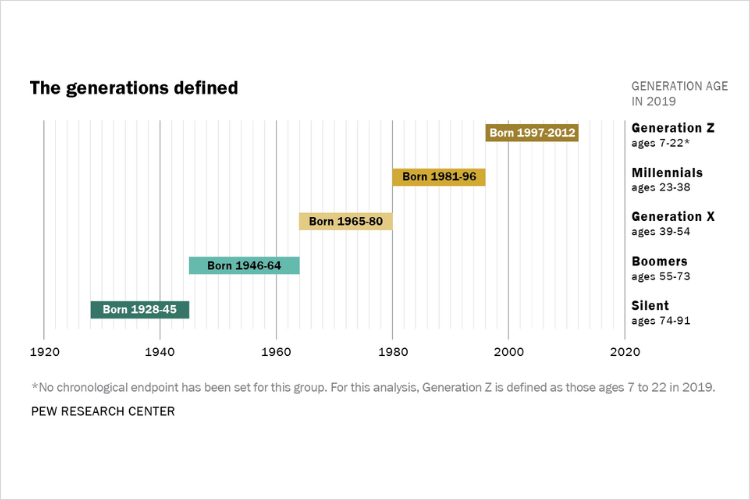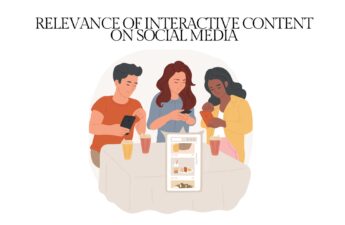In recent years, there has been a persistent misperception that Gen Z and millennials are practically the same. When businesses talk about targeting younger audiences, many frequently combine Generation Z and millennials into one group and develop the same campaign approach that would work for both generations. Although both have some similarities, Millennials and Gen Z do not respond to marketing campaigns similarly.

According to a study by Pew Research Center, millennials were born between 1981 and 1996. Whereas people born between 1997 and 2012 qualify as Gen Z. Thus, the age range of Millennials in 2022 will be between 25 and 41, and Gen Z’s age will lie between 7 and 25.
What kind of content do millennials like compared to Gen Z?
Millennials are attracted to visual and textual data, with a high preference for visual data. They are more likely to find their desired content on websites like Facebook, Youtube, and Instagram, in addition to Linkedin and Twitter. Millennials will find content with high descriptive data to be preferable.
Gen Z, on the other hand, is more interested in highly visual content with minimal or zero textual aspects. Their ideal content is short-timed, so it is quick to consume and understand. Their preferred platforms include Tiktok, Snapchat, and Instagram, among other short-form video apps.
5 factors that differentiate millennials and gen Z:
1. They have different attitudes about technology:
Millennials grew up using DVD players, giant personal computers, and cell phones with tiny screens. In contrast, Gen Z has access to iPads, smartphones, endless wi-Fi, or streaming services.
2. Gen Z is more likely to make mobile purchases:
Millennials and GenZ both spend time watching videos and social media sites. When comparing their online content consumption, millennials watch videos for 2.4 hours a day, whereas Gen Z averages 3.4 hours.
3. Both have different online platforms preferences:
Gen Z and millennials have a few mutual social platform preferences like Instagram. However, millennials prefer Youtube or Facebook over Gen Z’s liking for Tiktok or other short format video platforms.
4. Their attention span towards online ads is distinct:
Those advertising or marketing to millennials can get away with slightly longer content. However, those marketing to Gen Z may want to get their value proposition out as quickly as possible.
5. Gen Z is likely to purchase less than the millennials:
While Gen Z is an active online viewer, they have less buying power. They plan to spend their money pragmatically compared to other millennials who have increased ability to make a purchase.
Social marketing Campaign for Gen Z and Millennials:
If you absolutely can’t budget a pinpointed campaign for millennials and Gen Z, but know you want to market to young adults, focus on the cusp of both generations by creating a campaign for 18 to 34-year-olds. It will allow you to zone in on young and slightly older people that can make purchasing decisions. To get best results, hire a social media marketing agency who is adept had managing multiple customer segmentation on social platforms.
How to market to each generation?
Both generations have a lot of things in common. And while there are opportunities to market to both generations at once, it might be more beneficial to brainstorm creative campaigns that zone in one group age or the other. To help you develop a strategy that gains attention from the appropriate audience.
New marketing trends alongside some aged, ongoing trends that are still effective
- Chatbots
- Voice searches
- Videotape marketing
Gen Z on their terms about Social Media Marketing:
The most recent consumer group is Generation Z. Those born just at the turn of the century and are now turning 18 and entering the pool. Some sources claim Generation Z will make up 40 per cent of all consumers in 2022. Among other effects, marketing to Gen Z means a sharp turn in how you stylize your content. The youthful request is also the quirkiest, with tastes that may feel weird if you are used to marketing to boomers or generation X. Still, there is a quick list of their general values to keep in mind if one of your top markets is Gen Z.
- Authenticity– Having grown up online in a period of misinformation, Gen Z is sensitive to authenticity and can smell phonies from far away. Avoid extravagant promotional approaches and conclude for transparency.
- Privacy– Enterprises rank Gen Z among the groups that value their privacy the most. When dealing with this generation, esteeming their data will earn you further than using it against them.
- Diversity– The most different generation yet, appreciates that diversity reflected in the videos and images they see online. To attract Gen Z, create diverse content pleasing a wider audience.
- Sense of humour– Gen Z humour has been described as absurdist and other foot-polite euphemisms. If you want to engage with the audience in their style, hire someone who understands the same.
The key differences in social media between millennials and Gen Z:
On one side, you have a generation of savvy digital connoisseurs who have never known life without social media. On the other, you have a generation who witnessed the shift to digital and vividly remembered when Facebook first stepped onto the same.
Key differences you need to know when marketing to each:
- Social Media Usage Trends
- Brand Trust and Loyalty
- Customer Experience
- Online shopping Trends.
The Latest Trend of Gen Z in Social Media Marketing:
Social media marketing is to address huge followership on different social media platforms. Then we have some noteworthy trends to make the most from social media marketing. The commercial world wants to work the benefits of the potential social media platform through social media marketing ways. Arising technologies like IoT and AI evolved to strengthen their position in the commercial world.
There are some trends on social media that we use for the best result:
- Rise of stoked Reality
- The adding fashionability of Instagram stories
- Continued investment in influencer marketing
- Expansion of Live streaming
- Facebook spaces go mainstream
- Personalization will be the norm. Micro-influencers will be on the rise.
- Videotape content will gain ground.
- Private social messaging will grow fleetly.
- Stoner-generated content will become concentrated.
The digital period is veritably rich in different social media platforms and kinds of social media. The choice is up to you. It all depends on your purpose behind using a platform, the things you promote, and your target audience. People don’t want to do business with faceless, major corporations. The audience wants to interact with real people and get treated like people. If you give these initiatives a higher priority in your marketing strategy, you will see how well they engage consumers of all ages.


